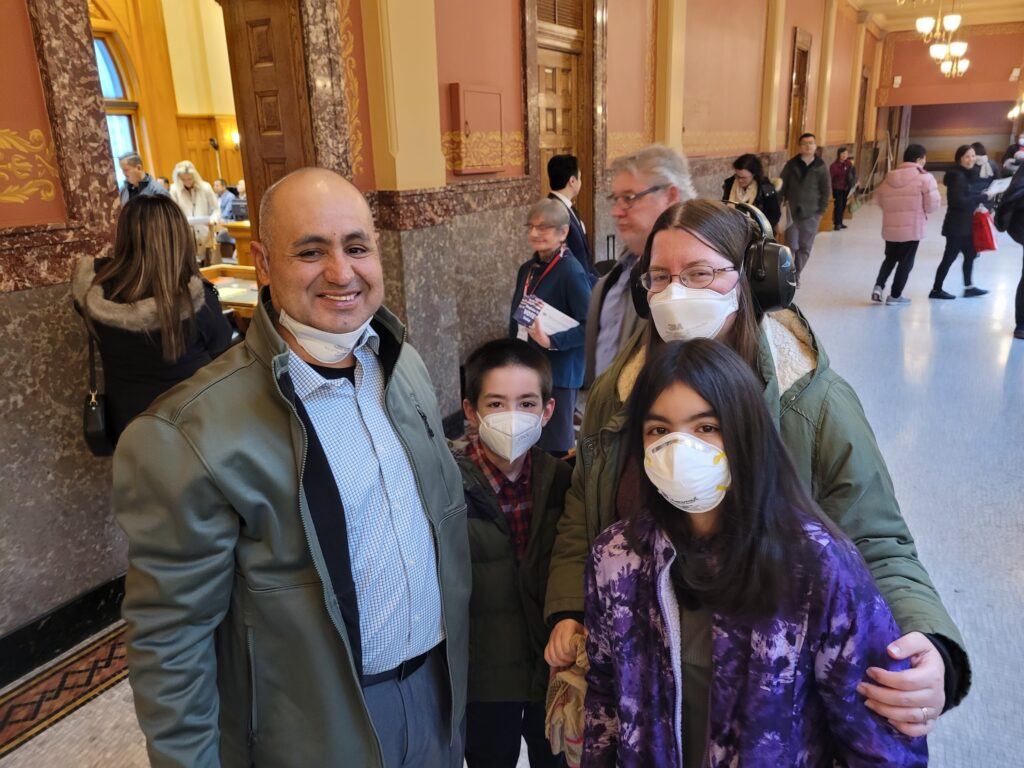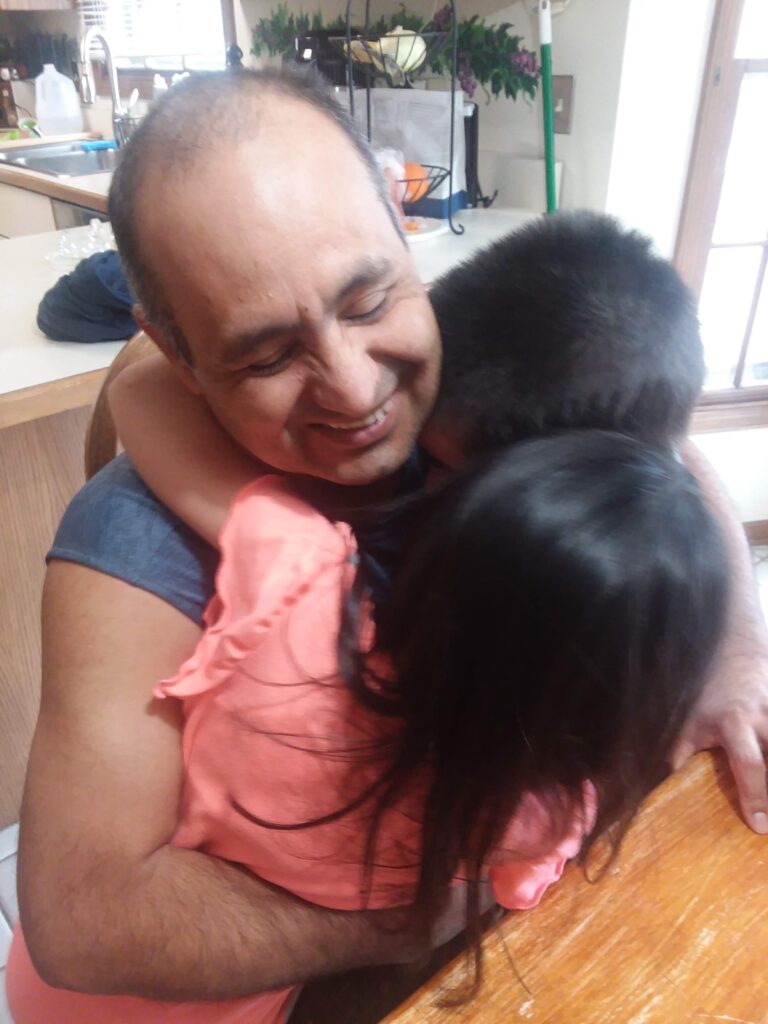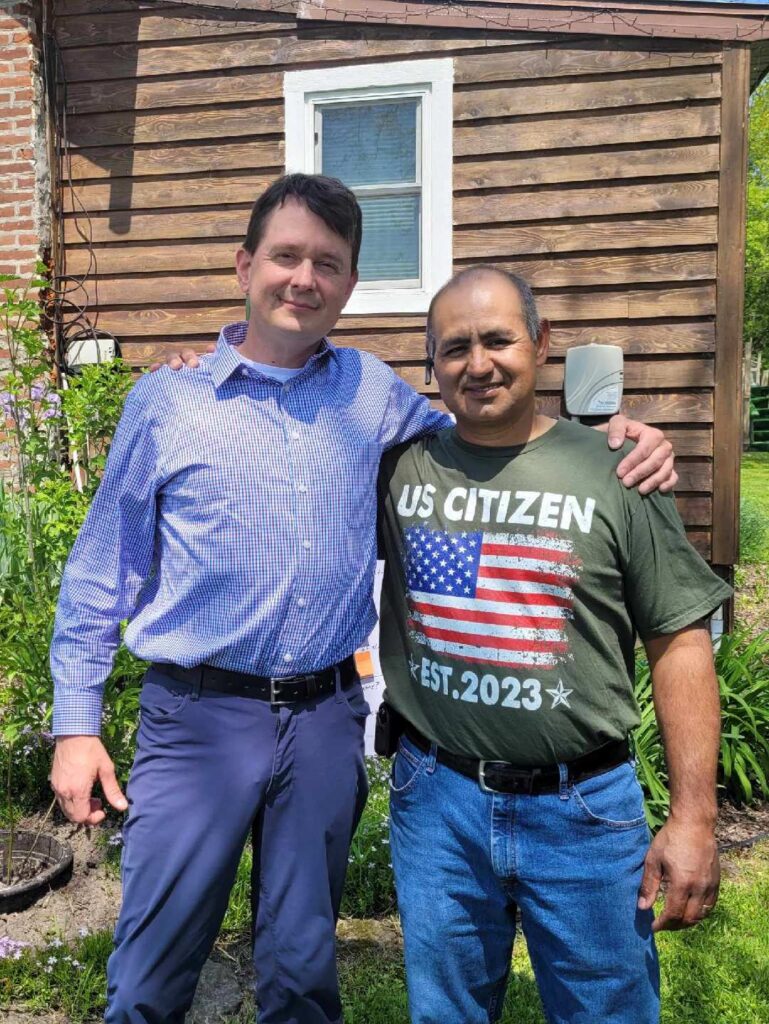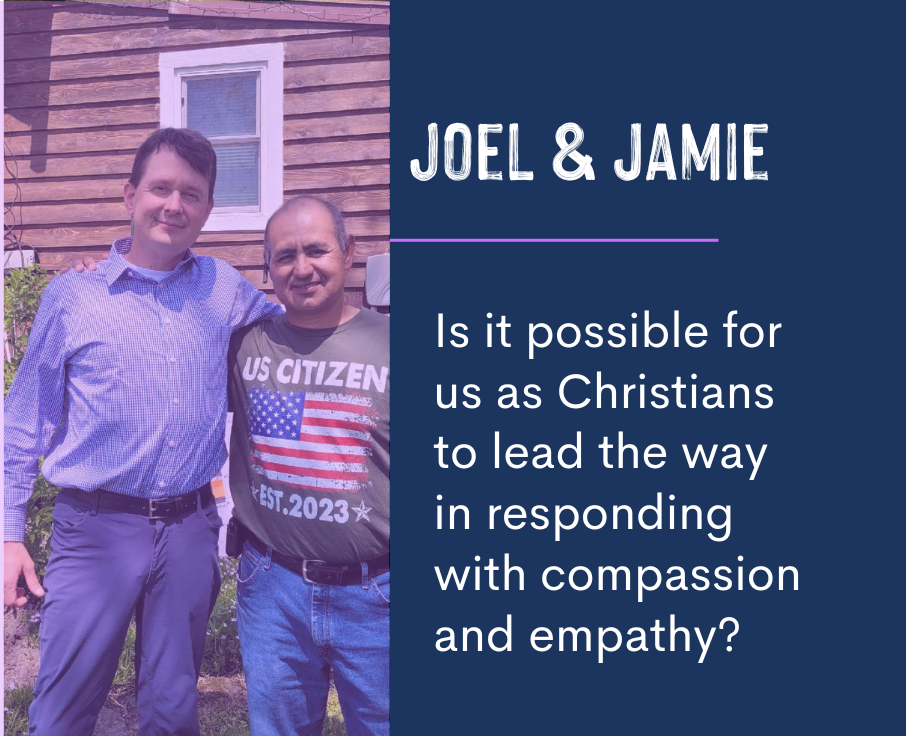Immigration is not just a political issue but a deeply personal and human experience. Beyond the staggering statistics associated with the current influx at our southern border, there are people made in the image of God and deserving of love and care. Each person has a unique story that led them there, and when we listen, we offer dignity and kindness. Is it possible for us as Christians to lead the way in responding with compassion and empathy?
Joel and Jamie’s Story

When Joel, an undocumented immigrant, and Jamie, an American citizen, first married they knew they would face legal hurdles and challenges as they began the daunting process of adjusting Joel’s status. What they were not prepared for was the lack of support, verbal abuse, and losing friendships along the way.
“We wanted to be open and honest and adjust Joel’s status the right way,” explains Jamie, “but we were met with discouraging voices. Multiple people, including family members, friends, and several immigration lawyers, told my husband he had no chance to obtain legal status.”
The couple’s hopes were further dimmed when they learned that due to changes in immigration laws in 1996, Joel, who had crossed the border in 1997, was now facing a possible automatic lifetime ban. Lawyers explained what could have been an easy case had he crossed just one year prior, was now near impossible.
“When I heard the words, ‘automatic lifetime ban’ my heart sank,” remembers Jamie. Leaving the U.S. with Joel was not an option because she needed specialized medical care for a condition that had worsened under the stress of their situation. The couple had also started to grow their family, and the thought of living apart was devastating.
“I was potentially facing having to leave the U.S. for at least 10 years,” explains Joel, “and then I would be able to begin the reentry process.”
Feeling hopeless and afraid, Joel and Jamie leaned on their faith and turned to their support system. “We had some support from the church,” explains Jamie, “but we also experienced unkind words and actions from the church and many Christians that we knew. We lost a lot of friends once they found out my husband’s true legal status was undocumented.”
From reading the hateful rhetoric posted by Christian friends online and listening to the political viewpoints of fellow church members, Joel and Jamie didn’t know who they could trust with their story. “Once during a men’s prayer group at church, I was asked about my opinion on immigration,” recalls Joel. “When I admitted my status, one man told me I had no voice and needed to be silent.”
The verbal abuse Joel endured, especially from those in the church, was in some ways harder than the legal hurdles they were facing. In 2018, Joel and Jamie made the difficult decision to leave their church and started attending a Spanish-speaking church with a mixture of people from different nations.
“At the new church, we felt free to share our story and for the first time in a long time, we felt accepted,” says Jamie.
Finding Support in Unlikely Place
Even though there are close to fifty churches in Joel and Jamie’s small community of about 6,000 people, they felt little compassion or empathy from Christians. It was outside of the church where they found the most support. The town Mayor, who had been Jamie’s pharmacist, Joel’s clients, the Chief of Police, and officers in the sheriff’s department, all offered encouragement and support.
“I was volunteering as a translator for the sheriff’s department,” remembers Joel, “and every officer that I got to work with was incredibly supportive. They saw people for people, saying it didn’t matter their status.”
The police department worked alongside Joel to help the immigrant community, including starting a substance abuse program for teens. Joel also felt heard when he advocated among local politicians the necessity of driver’s licenses for undocumented immigrants.
“Our state is one in which you can’t get a driver’s license if you are undocumented,” explains Joel. “One politician told me he personally supports policies that would allow for driver’s licenses, especially since undocumented immigrants are working and paying taxes, but unfortunately his constituents do not agree.”
A Glimmer of Hope

After meeting many lawyers who offered little hope, Joel and Jamie finally found an immigration attorney who thought they had a chance and was willing to take their case. “We have gone through so much just to get to the point of being able to qualify and submit a case and keep it going,” explains Joel. “The process is intensive, intrusive, and very thorough.”
On February 20, 2019, Joel and Jamie reached a turning point in Joel’s immigration journey. He had an appointment at the U.S. Consulate in Juarez, Mexico for his green card interview. “When Joel left for Juarez, we didn’t know if or when we would see him again,” remembers Jamie.
They planned ahead of time in case he was delayed or denied re-entry. Jamie had Joel sign a notarized form saying she had permission to take their kids across the border without him. They talked about what they would do if he was never allowed back, such as who would sell all of their belongings and home.
Upon arrival, Joel had to navigate through different waiting areas, at times outside in the cold, along with hundreds of other people. Officials were yelling and no one was allowed to speak to anyone else.
“I was so grateful our lawyer had prepared me well,” says Joel. “The questions are meant to be intimidating and throw you off to weed out the people who have made up stories. It’s a very intense process.”
Thankfully, all of their hard work paid off and Joel was successful — he received his green card that day and was allowed to return to his family in the U.S. “It almost didn’t feel real after having gone through such a long process,” explains Joel. “Once I received my green card, there was still a long journey ahead for citizenship. You have to qualify and meet all sorts of criteria, not just be eligible.”
Finding Belonging

When Joel applied for citizenship, the lawyer who initially took his case and helped him obtain the green card was now in private practice but actually celebrated alongside the family when he finally became a citizen. Joel and Jamie’s story, which began with multiple discouraging voices and many legal hurdles, ultimately culminated in Joel becoming a U.S. citizen in January of 2023.
“Sometimes I catch myself remembering I am a citizen and don’t have to look over my shoulder anymore,” says Joel. “I rewatched the video of my Naturalization Ceremony to convince myself I was there. At the end, the judge said to us, “Don’t forget your former nationality and where you came from, even though you are now an American citizen, that is what makes this country rich in culture.”
Joel and Jamie want to share their story with others so that more will understand the struggle of those who want to adjust their status with little ability to do so.
They also want to challenge the church to love those among them regardless of origin or status. They are now meeting in their home on Sundays with one other family and are looking for a church home that will welcome their family. They said their faith sustained them through their trials and they want to love and encourage others to keep looking to God for the strength and hope to make it through, no matter what their story holds.

 This resource answers the most common questions Christians have about immigration and equips you to engage conversations with biblical clarity, truth, and grace.
This resource answers the most common questions Christians have about immigration and equips you to engage conversations with biblical clarity, truth, and grace.